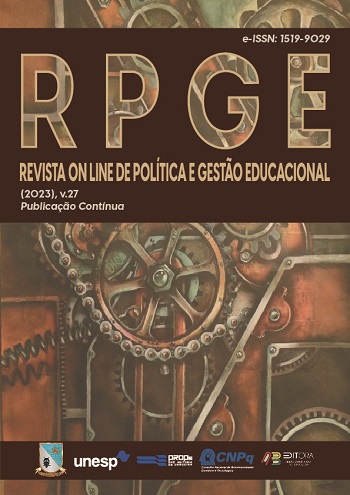Effect of TED Talks videos on the effectiveness of teaching English monologue speech to management students
DOI:
https://doi.org/10.22633/rpge.v27i00.18530Keywords:
English language, Teaching, Monologue speech, TED TalksAbstract
At present, a key role in teaching English is played using TED Talks video materials. They provide ample opportunities to develop and improve students' speech skills and ability to understand English in an engaging and informative way. The study aims to assess the impact of using contemporary media content from TED Talks on improving the effectiveness of training management students in English-language monologue speaking. The presented experimental results confirm the efficiency of teaching English-language monologue speech to university students with the use of the Ted Talks video hosting platform.
Downloads
References
ABISHOVA, G. Monologue Speech in a Foreign Language Lesson. International Journal on Integrated Education, v. 5, p. 215-217, 2022.
ALAKRASH, H. M.; RAZAK, N. A. Education and the fourth industrial revolution: Lessons from COVID-19. Computers, Materials and Continua, v. 70, n. 1, p. 951-962, 2021.
BAJRAMI, L.; ISMAILI, M. The role of video materials in EFL classrooms. Procedia-Social and Behavioral Sciences, v. 232, p. 502–506, 2016.
BOGATYREVA, S. et al. Use of TED-conference materials to increase motivation for learning and improve the effectiveness of students’ independent work at the initial stage of learning english. Revista Conrado, v. 18, n. 86, p. 207-213, 2022.
BORODINA, M. et al. Influence of corporate distance training in english on the efficiency of international cooperation development. Revista Conrado, v. 19, n. 91, p. 306-312, 2023.
DOLZHENKOV, V. N. et al. Application Of Podcasting In Teaching Spoken Professionalforeign Language Skills To Students. Revista EntreLinguas, v. 7, n. esp.5, 2021. 10.29051/el.v7iesp.5.16025.
DZASEZHEVA, L. et al. Impact of Multimedia Technology on the formation of foreign language communicative competence in students. Revista Conrado, v. 19, n. 90, p. 297-303, 2023.
FITRIA, T. N. Using TED Talks In English Language Teaching (ELT): Supplemental Resources for English Language Teaching (ELT). SOSMANIORA, v. 1, n. 1, p. 36-43, 2022.
GLADYSHEVA, E. The Concept Of Creative Doing As The Basis For The Organization Of Educational And Design Research Work Of University Students. Revista on line de Política e Gestão Educacional, Araraquara, 26, 2022. DOI: 10.22633/rpge.v26i00.17342.
HARB, G.K. TED Talks: An Approach for Activating the World Knowledge Schema of EFL Writers. International Journal of Language and Linguistics, v. 5, n. 4, p. 76-85, 2018.
KOSTROMINA, E. et al. Development Of A Management Model For The Marketing Activities of An Industrial Enterprise Based On Incoming Controlled And Uncontrolled Variables. Revista Gestão & Tecnologia, v. 22, n. 4, p. 384-399, 2022. DOI: 10.20397/2177-6652/2022.v22i4.2396.
KUSUMASTUTY, P. E. et al. Student’s Perceptions of Using TED Talks to Improve EFL Speaking Skill. In: UICELL Conference Proceeding, p. 1-14, 2019.
MARÍA, M. H. et al. TED Talks as an ICT Tool to Promote Communicative Skills in EFL Students. English Language Teaching, v. 11, n. 12, p. 106, 2018. DOI: 10.5539/elt.v11n12p106.
NURSAFIRA, M. S. TED Talks in EFL Context: An Alternative Way for Teaching and Improving Student’s Speaking Skills. ELSYA: Journal of English Language Studies, v. 2, n. p. 43-47, 2020.
RAMAZANOVA, D. et al. Using Instagram to raise the effectiveness of distance learning in English: The experience of Kazakhstani students. Frontiers in Education, v. 7, 2022. DOI: 10.3389/feduc.2022.923507.
SAFRONOVA, N. et al. Assessment of the impact of satisfaction with management companies on housing and communal services market development. Quality - Access to Success, v. 24, n. 193, p. 230–237, 2023. DOI: 10.47750/QAS/24.193.26
SCOTTO DI CARLO, G. New trends in knowledge dissemination: TED Talks. Acta Scientiarum Language and Culture, v. 36, n. 2, p. 121–130, 2014.
SERGEEVA, M. G. et al. Preparation of future education managers for professional activities. Revista on line de Política e Gestão Educacional, v. 26, n. esp. 2, 2022. DOI: 10.22633/rpge.v26iesp.2.16566.
SHELESTOVA, T. et al. The advantages of using TED talks materials in ESL classrooms. Journal for Educators, Teachers and Trainers, v. 12, n. 2, p. 81-87, 2021.
TOLMACHEV, M. et al. Development of Students’ Digital Competence When Using the “Oracle” Electronic Portal. European Journal of Contemporary Education, v. 11, n. 4, p. 1261–1270, 2022. DOI: 10.13187/ejced.2022.4.1261.
TREMPOLETS, L. et al. Policies Aimed At The Digitalization Of The Russian Government. Lex Humana, v. 15, n. 2, p. 487–498, 2023
Published
How to Cite
Issue
Section
License
Copyright (c) 2023 Revista on line de Política e Gestão Educacional

This work is licensed under a Creative Commons Attribution-NonCommercial-ShareAlike 4.0 International License.
Manuscritos aceitos e publicados são de propriedade da Revista on line de Política e Gestão Educacional. É vedada a submissão integral ou parcial do manuscrito a qualquer outro periódico. A responsabilidade do conteúdo dos artigos é exclusiva dos autores. É vedada a tradução para outro idioma sem a autorização escrita do Editor ouvida a Comissão Editorial Científica.











